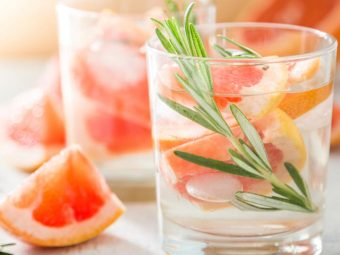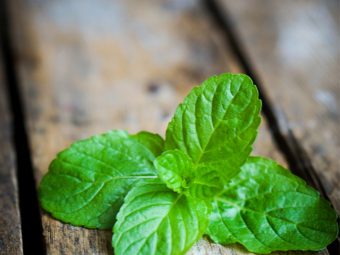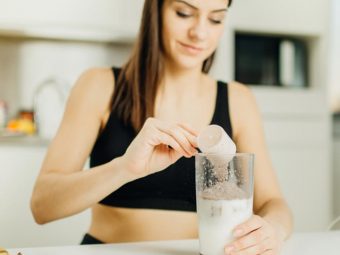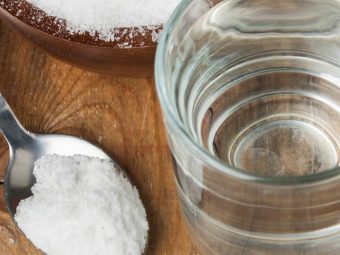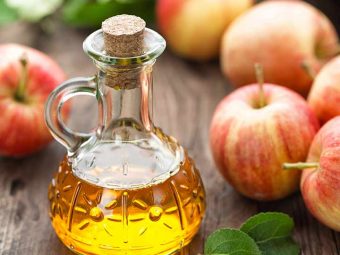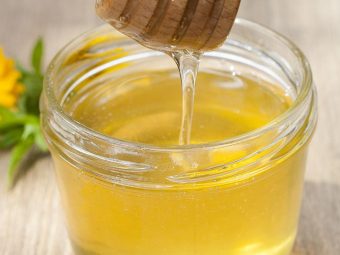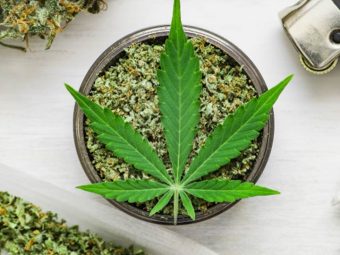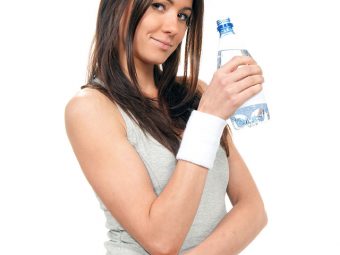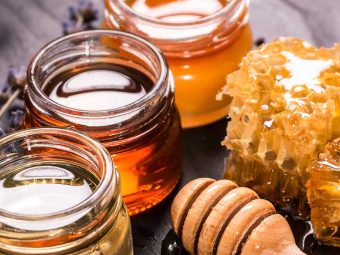Does Drinking Water Help With Acne?
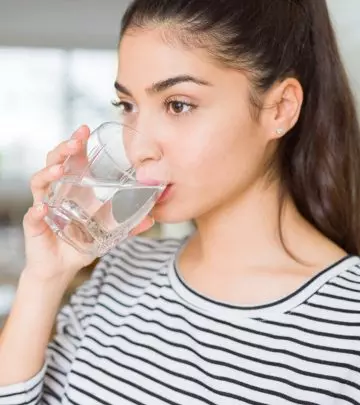
We all have heard the advice to drink water for a healthy body, skin, and hair. Drinking water may resolve several skin issues like dryness and keep it plump. However, does drinking water help acne? Yes, it can help you manage acne issues. How may it help?
Drinking water, as you know, has many benefits for your overall health. But, if you want to find out how drinking water can help solve acne issues, you need to read this article. Keep reading to know more.
In This Article
Drinking-Water And Acne: The Science
Adequate consumption of water has an indirect effect on your skin. It keeps your body and skin hydrated and can flush out toxins from your body. But, when it comes to the connection between your daily water intake and clear skin, experts are still unsure.
There is no proper research to suggest that drinking a lot of water can directly reduce acne and blemishes (1). Nor are there studies showing that drinking less water will have absolutely no effect on your skin. So breakouts or not, you should still drink plenty of water.
All in all, anecdotal evidence suggests that constantly drinking water can clear your skin up and minimize pimples. So, if you have struggled with acne for years, there is no harm in drinking more water to see if it works for you.
In fact, it has other benefits for your skin that you may not be aware of. Find out what they are below.
The Benefits Of Drinking Water For Your Skin Acne
While consuming water may not affect your acne, it can offer some other skincare benefits:
1. Combats Dryness
Hydration is a pivotal part of skincare for those with dry, sensitive skin. If your body is dehydrated and you start drinking more water, it can have a positive impact on your complexion. According to research, drinking the right amount of water can get rid of flaky and dry skin. It may improve your skin physiology, especially if you tend to consume less water (2).
2. May Flush Out Toxins
Anecdotal evidence suggests that if you drink sufficient water daily, it flushes out toxins from your body and keeps it rejuvenated. Those with combination and oily skin are likely to develop clogged pores, which leads to irritation and breakouts.
Drinking water may cleanse the bacteria and dirt that cause acne and other skin problems. However, more research is required to understand whether this detox effect works on severe acne.
3. Smoothens The Skin
Drinking water may also give you smooth and glowing skin, according to anecdotal evidence. Adequate hydration allows your skin to retain its moisture, keeping it soft and supple. Preliminary research shows that water may even slightly enhance skin elasticity (3). However, note that there is not enough scientific evidence to support this claim.
4. Reduces Inflammation
Hydration may be your best bet to control skin irritation and inflammation. Water is naturally non-reactive and can soothe inflamed skin or acne breakouts when applied externally. Anecdotal evidence suggests that cool water can reduce painful pimples or redness on the face.
As stated earlier, consuming water prevents any bacterial growth or dirt lodging in the skin, which may further reduce the chances of inflammation. But, bear in mind that these claims are not evidence-based.
Your skin can get better if you drink a lot of water. But, how much should you drink daily to see a visible difference in your complexion? Find out below.
How Much Water Should You Drink?
Truth be told, there is no yardstick to measure the exact amount of daily water intake. But, in order to be sufficiently hydrated, it is recommended to drink 8 glasses of water every day.
You can also drink other beverages to combat dehydration. The total amount of fluids that adult men must consume is 2.7 liters per day, which is approximately 11.5 cups. Adult women should drink 3.7 liters of fluids per day, or approximately 15.5 cups, to properly hydrate their skin (4).
These fluids include other indirect sources like tea, coffee, soda, milk, fruits, etc. However, drinking plain water is the best way to keep your skin clear since it has zero calories.
You may need to increase your water intake if you lead an active lifestyle, live in a hotter climate, or have other health issues.
Drinking water offers several benefits for your body and skin. Drinking water regularly keeps your skin hydrated, flushes toxins out of your system, and may reduce skin irritation and inflammation. While there is no scientific evidence that supports the question— “does drinking water help acne?”, anecdotal evidence suggests that water may prevent bacterial growth and reduce pimples and acne. It is recommended that women drink 15.5 cups of water every day while men drink 11.5 cups of water every day to keep their skin hydrated, plump and healthy.
Key Takeaways
- Anecdotal evidence suggests that drinking enough water may have a detoxifying effect on the skin.
- It may thwart bacterial growth and clear away the dirt piled up on the skin, reducing the risk of skin inflammation.
- According to a study, men and women should consume 2.7 liters and 3.7 liters of water, respectively, to keep their skin properly hydrated.
Frequently Asked Questions
How long does water intake take to clear skin?
Staying hydrated is essential for overall health and maintaining clear skin and a healthy glow. Drinking 2 liters of water daily for at least four weeks can enhance your skin’s appearance.
Is drinking cold water good for acne?
Anecdotal research suggests that cold water is beneficial for dry and acne-prone skin. Cold water is a fantastic choice if you have dry skin because hot water can deplete the levels of sebum and cause more harm than good.
References
Articles on StyleCraze are backed by verified information from peer-reviewed and academic research papers, reputed organizations, research institutions, and medical associations to ensure accuracy and relevance. Read our editorial policy to learn more.
- Nutrition and water: drinking eight glasses of water a day ensures proper skin hydration-myth or reality?
https://pubmed.ncbi.nlm.nih.gov/20620753/ - Dietary water affects human skin hydration and biomechanics
https://www.ncbi.nlm.nih.gov/pmc/articles/PMC4529263/ - Does dietary fluid intake affect skin hydration in healthy humans? A systematic literature review
https://pubmed.ncbi.nlm.nih.gov/29392767/ - Report Sets Dietary Intake Levels for Water, Salt, and Potassium To Maintain Health and Reduce Chronic Disease Risk
https://www.nationalacademies.org/news/2004/02/report-sets-dietary-intake-levels-for-water-salt-and-potassium-to-maintain-health-and-reduce-chronic-disease-risk - Get the Facts: Drinking Water and Intake
https://www.cdc.gov/nutrition/data-statistics/plain-water-the-healthier-choice.html





